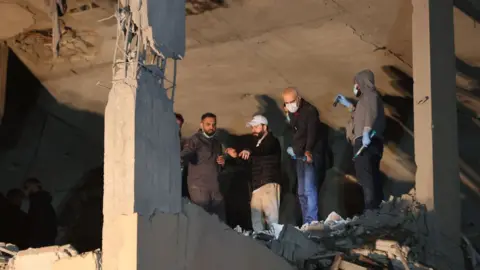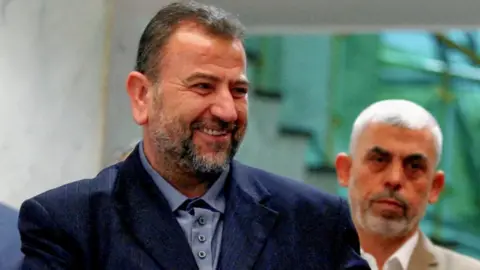Hamas deputy leader Saleh al-Arouri's assassination sparks wider war fears
 AFP
AFPThe shadows stretching across the Middle East and beyond, since the start of the Israel-Gaza war, are now longer and darker with the killing of senior Hamas leader Saleh al-Arouri in Lebanon.
Arouri, a deputy political leader of Hamas, was killed in a drone strike in southern Beirut. He was a key figure in the Izzedine al-Qassam Brigades, Hamas's armed wing, and a close ally of Ismail Haniyeh, the Hamas leader. He had been in Lebanon acting as a connection between his group and Hezbollah.
Even before the 7 October war erupted, Lebanese Hezbollah leader Hassan Nasrallah had warned that any targeted attack on Lebanese soil would trigger a "powerful response".
But Hezbollah and its Iranian allies know the shape of their reply now, in the burning heat of hostilities, could change the shape of this war - and Hezbollah's fortunes.
It was no secret it was only a matter of time before Hamas leaders outside Gaza would be targeted.
Israel will "operate against Hamas leaders wherever they are". That was Prime Minister Benjamin Netanyahu's warning in November.
Months earlier, he explicitly mentioned Arouri. Hamas's deputy leader was also on the US terrorism list with a bounty of $5m (£4m) on his head since 2018.
Israel doesn't usually confirm or deny assassinations, but this long conflict is a chronicle of targeted killings. It's also a history of retaliation and revenge.
Israel will now be braced for reprisals. There are clarion calls from Hamas leaders and their allies, from the streets of the occupied West Bank and beyond.
 Reuters
ReutersHezbollah and Hamas will need to do something, and be seen to do it.
Hezbollah's first statement called for patience.
Before this moment, this well-armed military and political force had tried to confine its engagement to a war of words, as well as limited attacks across its southern border with Israel to avoid drawing Lebanon into another costly conflagration.
The killing of a Hamas official who was a pivotal link to Hezbollah and Iran, in one of its strongholds in Beirut's southern suburbs, has jolted its calculations. But it must be weighing up short-term spectacular strikes, against its much longer game.
Its support along Lebanon's volatile southern frontier is strong. But, in Beirut and beyond, memories of the devastating 2006 Israel-Lebanon war are still raw in a country now reeling from multiple crises of its own making.
It is also no secret that senior Israeli figures have long been pushing to maximise this opportunity to eradicate Hezbollah's threats to its northern communities.
Reprisals and calculations
Hostilities on this front have so far been sustained - but contained - as Israeli forces are stretched across Gaza and the West Bank.
Israel's staunchest ally, the US, has also repeatedly warned against taking the war to Hezbollah, which could have far-reaching reverberations.
This new crisis provoked by the killing of Arouri and six others, including two Hamas military commanders, has come at a time of mounting tension on other fronts, including the vital Red Sea shipping lanes where Iran-backed Houthis have been attacking vessels they say are linked to Israel.
Israel's Defence Minister Yoav Gallant recently spoke of seven theatres from where Israel was under attack, including Yemen, Lebanon, Syria, and Iraq.
There is now an even louder chorus of calls for restraint, from Western capitals to Lebanese politicians and UN peacekeepers there, amid intensifying worry of an even wider war.
But Israel has been categorical from the start.
Its war aim is to "destroy Hamas". That means going after its infrastructure, military and political leaders, and finances.
Nearly three months on, it admits there is still a long way to go.
Many Israeli foes, as well as friends, question if Hamas can be destroyed through military might and a campaign causing a staggering number of civilian deaths, and a dire humanitarian catastrophe giving rise to profound pain as well as deep-seated anger.
The masterminds of Hamas's 7 October atrocities in southern Israel, including Yahya Sinwar, are still believed to be hiding somewhere in Gaza despite Israel's turbo-charged manhunt.
Arouri's death in Lebanon will be concentrating minds in Turkey and Qatar, where Hamas leaders are also based, believing they are safer there.
It will be weighing heavy, too, on the minds of Israeli families whose loved ones are still being held hostage somewhere in Gaza.
One of the first casualties of this assassination has been the halt in the indirect talks in Cairo about another exchange of hostages for Palestinians imprisoned in Israel jails.
Prime Minister Netanyahu keeps insisting "only pressure will work".
Israel has now turned the screws even tighter.
